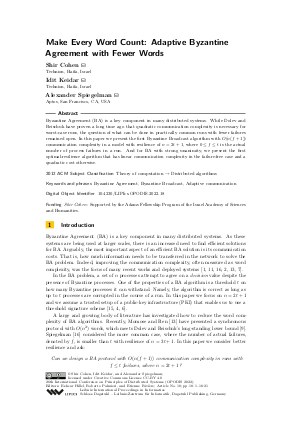Make Every Word Count: Adaptive Byzantine Agreement with Fewer Words
Authors Shir Cohen, Idit Keidar, Alexander Spiegelman
-
Part of:
Volume:
26th International Conference on Principles of Distributed Systems (OPODIS 2022)
Part of: Series: Leibniz International Proceedings in Informatics (LIPIcs)
Part of: Conference: International Conference on Principles of Distributed Systems (OPODIS) - License:
 Creative Commons Attribution 4.0 International license
Creative Commons Attribution 4.0 International license
- Publication Date: 2023-02-15
File

PDF
LIPIcs.OPODIS.2022.18.pdf
- Filesize: 0.71 MB
- 21 pages
Document Identifiers
Subject Classification
ACM Subject Classification
- Theory of computation → Distributed algorithms
Keywords
- Byzantine Agreement
- Byzantine Broadcast
- Adaptive communication
Metrics
- Access Statistics
-
Total Accesses (updated on a weekly basis)
0PDF Downloads0Metadata Views
Abstract
Byzantine Agreement (BA) is a key component in many distributed systems. While Dolev and Reischuk have proven a long time ago that quadratic communication complexity is necessary for worst-case runs, the question of what can be done in practically common runs with fewer failures remained open. In this paper we present the first Byzantine Broadcast algorithm with O(n(f+1)) communication complexity in a model with resilience of n = 2t+1, where 0 ≤ f ≤ t is the actual number of process failures in a run. And for BA with strong unanimity, we present the first optimal-resilience algorithm that has linear communication complexity in the failure-free case and a quadratic cost otherwise.
Cite As Get BibTex
Shir Cohen, Idit Keidar, and Alexander Spiegelman. Make Every Word Count: Adaptive Byzantine Agreement with Fewer Words. In 26th International Conference on Principles of Distributed Systems (OPODIS 2022). Leibniz International Proceedings in Informatics (LIPIcs), Volume 253, pp. 18:1-18:21, Schloss Dagstuhl – Leibniz-Zentrum für Informatik (2023)
https://doi.org/10.4230/LIPIcs.OPODIS.2022.18
BibTex
@InProceedings{cohen_et_al:LIPIcs.OPODIS.2022.18,
author = {Cohen, Shir and Keidar, Idit and Spiegelman, Alexander},
title = {{Make Every Word Count: Adaptive Byzantine Agreement with Fewer Words}},
booktitle = {26th International Conference on Principles of Distributed Systems (OPODIS 2022)},
pages = {18:1--18:21},
series = {Leibniz International Proceedings in Informatics (LIPIcs)},
ISBN = {978-3-95977-265-5},
ISSN = {1868-8969},
year = {2023},
volume = {253},
editor = {Hillel, Eshcar and Palmieri, Roberto and Rivi\`{e}re, Etienne},
publisher = {Schloss Dagstuhl -- Leibniz-Zentrum f{\"u}r Informatik},
address = {Dagstuhl, Germany},
URL = {https://drops.dagstuhl.de/entities/document/10.4230/LIPIcs.OPODIS.2022.18},
URN = {urn:nbn:de:0030-drops-176385},
doi = {10.4230/LIPIcs.OPODIS.2022.18},
annote = {Keywords: Byzantine Agreement, Byzantine Broadcast, Adaptive communication}
}
Author Details
Funding
- Cohen, Shir: Supported by the Adams Fellowship Program of the Israel Academy of Sciences and Humanities.
References
- Ittai Abraham, Guy Golan-Gueta, and Dahlia Malkhi. Hot-stuff the linear, optimal-resilience, one-message bft devil. CoRR, abs/1803.05069, 2018. URL: http://arxiv.org/abs/1803.05069.
-
Ittai Abraham, Dahlia Malkhi, and Alexander Spiegelman. Asymptotically optimal validated asynchronous byzantine agreement. In Proceedings of the 2019 ACM Symposium on Principles of Distributed Computing, pages 337-346, 2019.

-
Eugene S Amdur, Samuel M Weber, and Vassos Hadzilacos. On the message complexity of binary byzantine agreement under crash failures. Distributed Computing, 5(4):175-186, 1992.

-
Dan Boneh, Ben Lynn, and Hovav Shacham. Short signatures from the weil pairing. In International conference on the theory and application of cryptology and information security, pages 514-532. Springer, 2001.

-
Christian Cachin, Klaus Kursawe, Frank Petzold, and Victor Shoup. Secure and efficient asynchronous broadcast protocols. In Annual International Cryptology Conference, pages 524-541. Springer, 2001.

-
Christian Cachin, Klaus Kursawe, and Victor Shoup. Random oracles in constantinople: Practical asynchronous byzantine agreement using cryptography. Journal of Cryptology, 18(3):219-246, 2005.

-
Shir Cohen, Idit Keidar, and Alexander Spiegelman. Not a coincidence: Sub-quadratic asynchronous byzantine agreement whp. In 34th International Symposium on Distributed Computing (DISC 2020). Schloss Dagstuhl-Leibniz-Zentrum für Informatik, 2020.

-
Yvo Desmedt. Society and group oriented cryptography: A new concept. In Conference on the Theory and Application of Cryptographic Techniques, pages 120-127. Springer, 1987.

-
Danny Dolev and Rüdiger Reischuk. Bounds on information exchange for byzantine agreement. Journal of the ACM (JACM), 32(1):191-204, 1985.

-
Danny Dolev, Ruediger Reischuk, and H Raymond Strong. Early stopping in byzantine agreement. Journal of the ACM (JACM), 37(4):720-741, 1990.

- Yossi Gilad, Rotem Hemo, Silvio Micali, Georgios Vlachos, and Nickolai Zeldovich. Algorand: Scaling byzantine agreements for cryptocurrencies. In Proceedings of the 26th Symposium on Operating Systems Principles, SOSP '17, New York, NY, USA, 2017. ACM. URL: https://doi.org/10.1145/3132747.3132757.
-
Vassos Hadzilacos and Joseph Y Halpern. Message-optimal protocols for byzantine agreement. Mathematical systems theory, 26(1):41-102, 1993.

-
Atsuki Momose and Ling Ren. Optimal communication complexity of authenticated byzantine agreement. In 35th International Symposium on Distributed Computing (DISC 2021). Schloss Dagstuhl-Leibniz-Zentrum für Informatik, 2021.

-
Oded Naor and Idit Keidar. Expected linear round synchronization: The missing link for linear byzantine smr. In 34th International Symposium on Distributed Computing (DISC 2020). Schloss Dagstuhl-Leibniz-Zentrum für Informatik, 2020.

-
Victor Shoup. Practical threshold signatures. In International Conference on the Theory and Applications of Cryptographic Techniques, pages 207-220. Springer, 2000.

-
Alexander Spiegelman. In search for an optimal authenticated byzantine agreement. In 35th International Symposium on Distributed Computing (DISC 2021). Schloss Dagstuhl-Leibniz-Zentrum für Informatik, 2021.

-
Zhuolun Xiang, Dahlia Malkhi, Kartik Nayak, and Ling Ren. Strengthened fault tolerance in byzantine fault tolerant replication. In 2021 IEEE 41st International Conference on Distributed Computing Systems (ICDCS), pages 205-215. IEEE, 2021.

